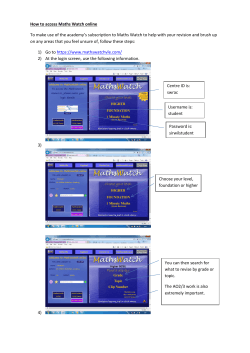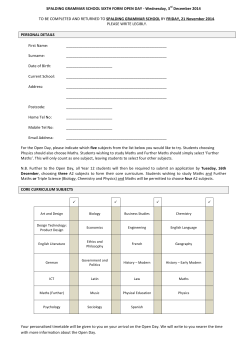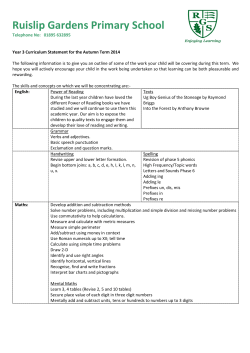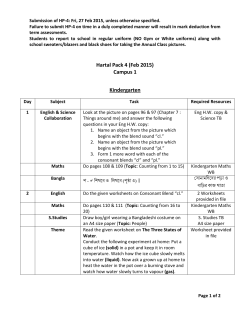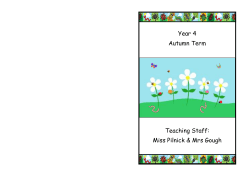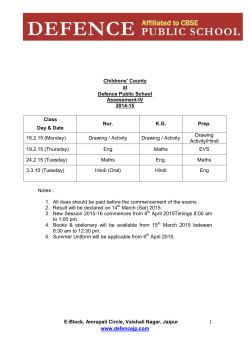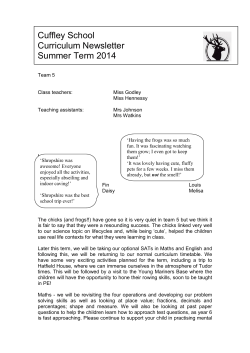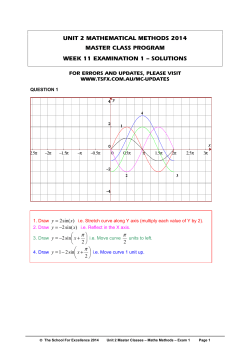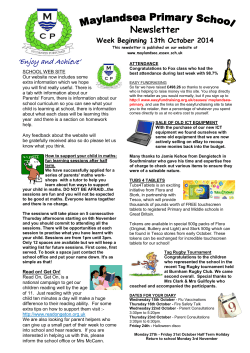
your FREE Maths guide! Our Practical Parents
PRACTICAL PARENTING GUIDE MATHS At sixes and sevens… There are those moments as parents that stay with you long into life. When your child is born, when they take those first steps, when they star in the Christmas nativity… and when they bring their first maths homework home. OK, that last one wouldn’t make the list of ‘momentous’ memories – The reality is that parenting is not an easy job. And in today’s world, the demands on parents to help your child learn, grow and prepare for life can be stressful and overwhelming. So when little Jonny or Jenny brings home increasingly complex maths homework (that may well prove complex for parent and child alike), it can easily add to the stress. What if there was a way to help your child learn maths in a fun, playful way? The solution is simple, yet in today’s serious world, we often forget it exists. By bringing educational games and play into the home, children are able to get to grips with challenging subjects – and discover joy in learning. Imagine exchanging hair-pulling maths homework for maths games and exercises that involve the wider family and leave everyone laughing and smiling. What could be better than that? Within this special BrainBox Practical Parenting Guide, you’ll find… • Why we need to break maths out of the classroom • Maths games for staying in and going out • Tips for turning a maths hater into a maths lover • Great maths games to play while travelling So let’s cut down a bit on the seriousness and start generating some maths smiles and laughs for everyone around! Yours playfully, Gary Wyatt Founder of The Green Board Game Co Brainbox Practical Parenting Guide | Maths 2 Breaking Out Of The Classroom Steve Humble (aka Dr Maths) explains how maths needs to escape the confines of the classroom if it is to take root in the minds of our children – and gives some starters on how parents can bring maths into everyday life… Learning mathematics outside the classroom is not enrichment, it is at the core of empowering an individual’s understanding of the subject. Mathematics educators have suggested that students should receive opportunities to use and apply mathematics and engage in mathematical modelling. Maths teaching outside the classroom is meaningful, stimulating, challenging, and exciting for students. Importantly, these experiences invite all students, irrespective of their classroom achievement level, to participate successfully in problem solving activities, gaining a sense of pride in the mathematics they create. Students’ mathematical eyes are opened as they discover real-world examples of shape, pattern, number, data, symmetry, and reflection, to name just a few. Students become mathematical detectives as they pose questions, solve problems, and document and communicate their discoveries in various ways. Mathematics is very much alive in the world around us and students come to appreciate this very quickly when real world triggers are used. Renowned Mathematics Professor Jo Boaler states: “Students do not only learn knowledge in the mathematics classrooms… students that engage in mathematical modelling can develop a deeper, conceptual knowledge of mathematics…that can have value beyond the classroom.” I am a great believer in taking maths onto the streets to confront people’s fears and anxieties, believing that the classroom can at times create only boundaries for many students to real life maths. Brainbox Practical Parenting Guide | Maths 3 Breaking Out Of The Classroom (continued...) Finding the pattern There are a great variety of patterns which have been discovered over the centuries by mathematicians. One of my favourites has to do with triangular numbers. A natural number is defined to be any positive whole number (for example 1, 2, 3, 4, 5, 6, 7…etc) By looking at a few natural numbers you can see how they can be made from triangular numbers and you can start to see how Gauss’s idea works. 2=1+1 5=3+1+1 12=10+1+1 1 1+2 = 3 19=10+6+3 25=21+3+1 You may like to check some more natural numbers to see how the pattern continues, but we cannot check them all! Mathematical proof can, and this shows the true power of maths as a subject. 3+3=6 6+4=10 Each subsequent number in the triangular number sequence is created by adding a row to the bottom of the triangle. So the next two triangular numbers are fifteen (10+5) and twenty-one (15+6). On the 10th July 1796, when he was 19 years old, Carl Friedrich Gauss wrote in his diary ‘I have just proved this wonderful result that any natural number is the sum of three or fewer triangular numbers’ Let’s go for a walk Here are some ‘puzzle walk’ questions you can drop into everyday life with your children: • How long, short, tall, high, deep, heavy? • How much do you see? How much more is hidden? • Can you find 5 of these….? • Can you continue this pattern? • What if we change this? • What if we add a line? • What if we add a shape? Brainbox Practical Parenting Guide | Maths 4 Making Maths Fun Gary Wyatt, Founder of The Green Board Game Co, recalls the little games he used to play as a parent to help make maths fun for his children… I’m all for providing a well-balanced education to my children but I must admit that if a child doesn’t like a particular subject, they just won’t apply themselves…and if they don’t apply themselves, they don’t learn. However – there’s a solution! Yes – you guessed it…turning learning into games can have a drastic positive impact on a child struggling within a particular area. Below are a few games that have worked for my family and many of our friends. Give them a go – or modify them to best suit you…but make sure you make it fun! Supermarket Add-Up Maths with Menus Whenever you go to a restaurant that offers paper menus ask if you can take one home with you. Offer your child a menu and tell them that they have £20 to spend and they can’t go over that amount. Explain that they can get dinner, drink and a dessert if they have enough and then let them work out what they’ll get and how much they’ll have left. You can expand this game by telling your child to order for the whole family – offering a higher amount. This game allows children to use maths in a real world context. Mathematical proof can and this shows the true power of maths as a subject. Whenever you go to a supermarket create a contest to see who can guess the total cost. For each item you put in the cart, give the price and let your child work on adding everything up. Whoever is closest can win a prize. Go Fishing Cut out some paper fish and put the answers to questions on the flash cards on the body of the fish. Also attach a paperclip to each fish. One person shows a flashcard (or asks a maths question) and the other goes fishing to pull out the correct answer. For my children, I made a fishing pole out of one of my garden bamboo rods. I just drilled a hole in the top, put some string on it with a magnet at the end. For some reason my son asked to play this simple little game despite his initial lack of interest in maths. Sometimes it’s something very easy that can create a massive change in attitude! Brainbox Practical Parenting Guide | Maths 5 From Maths Hater To Maths Lover Dave Vann, writer for The Green Board Game Co, recalls his unexpected maths journey and gives parents some ways to help non-maths loving children discover a joy for the subject… So your child hates maths. I get that, I really do. I was that skinny, playful little boy who just wanted to get outdoors or get stuck into a great book. Anything but maths. Wind the clock forward 25 years and you’ll find a young man happily poring over budgets, analysing survey data, devouring website statistics, and calculating odds. So what happened to turn this child who languished in the bottom maths group at secondary school into a self-confessed maths ‘lover’ who loves getting stuck into the numbers? 2. I realised money mattered! I remember standing at the sweet shop – sweets counted and in the bag, coins in hand… and not having enough of one to pay for the other. It was gut wrenching, embarrassing even. I had made a miscalculation – a schoolboy error, if you will – and my sweet tooth would end up paying for it. It was the beginning of a dawning realisation that there was a point to maths: budgeting. Since that early coinage faux pas, I’ve learned to master the money I have in my hand in order not to be caught out - whether pocket money, student loan, early marriage budget, or workplace sales forecasts. Here are the 3 BIG things that helped me gain a new perspective on maths… I’m pretty sharp on the numbers now, because I know that they matter – for my stomach, and other important areas of life. 1. I got friendly with sports stats 3. I saw the beauty in data Want to know what made me first realise that maths could be friend, not foe? Baseball. Strange as it might sound, growing up in America as a boy with a natural interest in sports meant that before long the numbers behind the game began to capture me. On my bookshelf at home is a book called Information is Beautiful. It’s a collection of some of the most beautiful, clever and interesting pictorial depictions of data. Sometimes called ‘Infographics’, at their best these depictions bring to life cold forms of data with the help of warm forms of art. Watching the rise and fall of batting percentages, tracking win/loss percentages, working out the Average Earned Run ratio (you get the idea) – it was all part of the fabric of the sport I loved. When my focus turned to football (of the round, kickable variety), statistics followed me too. Now it was about points needed to qualify for Europe, goal difference, goals per game ratio, etc. These infographics serve as a reminder that the world of maths, when given a touch of art, can in fact be beautiful. It’s a revelation that has allowed a number of people I know – those who see the world in picture form, especially – to find a doorway into the world of numbers. Because of my love for sport, I learned to love statistics. Brainbox Practical Parenting Guide | Maths So, if outbursts like “I hate maths!” are common in your home, perhaps these tactics might help your child follow a similar trajectory to mine – from maths hater to maths lover. 6 Maths On The Go... The school holidays don’t have to be the time when learning stops. Maths, in particular, lends itself to learning on the go. Here’s how… Just because school’s out for summer/Easter/Christmas doesn’t mean your kids’ learning needs to grind to a halt. With the possibility of long car journeys ahead, or the inevitable delays waiting for planes or trains, why not grab the moment and sneak in some fun but educational games. Steve Humble, aka Dr maths, believes that it’s important parents try to keep the learning process going when kids are out of school: “It’s a great opportunity to show kids that maths is all around them,” he says, “and not just something that they have to learn at school. Numbers, patterns, shapes, they’re all there outside of the classroom and in the real world.” So as well as packing one of Dr Maths’ books, or the fantastic BrainBox maths game, what else can you do to while away those long journeys? Here are a few ideas… 1. Countdown Game One simple game, not unlike the numbers round in the Channel 4 programme Countdown, is to spot a number with at least four digits – it could be a flight number, a shop sign saying when a firm was established, that kind of thing – and then try and use the individual numbers to make a target value. Targets with lots of factors like 24 and 36 are good ones to start with. So, for instance, the challenge could be to use 2651, the numbers on the side of a train, to make exactly 36, with a bonus point if you use all four numbers. 2. Spot That Shape Another game Steve suggests is to see how many different shapes you can spot. Squares, circles and rectangles are easy, but what about more obscure shapes like pentagons, or even all the different types of triangles such as equilateral, isosceles and scalene*. Set a time limit and the person to spot the most is the winner. 3. How Many…? Basic counting games can also help the time fly. In the car, everyone (best not to include the driver!) picks a colour and then records how many cars of that colour they see over a ten minute period. This also touches on issues of probability, with those looking for yellow cars, for instance, unlikely to be as successful as those spotting silver or red ones. You can also play this game in the departure lounge, spotting people with different coloured coats, wearing glasses, on the phone etc. And if the kids are really into it, they could even illustrate the results with a simple graph or pie chart. This is, of course, a variation on pub cricket, a game for the back roads which wend their way through the countryside, when you score runs each time there are ‘legs’ on a pub sign, and are out when there are none. So the White Hart would net you four and the Dog and Duck six, although it was never clear what you scored if you happened to drive past the Beehive… So there you have it – a few, fun ways to keep childrens’ maths brains switched on during holidays. Enjoy! * To save you a Google search, an equilateral triangle has three equal sides, an isosceles has two and a scalene none. Dr Maths (aka Steve Humble) A freelance mathematics consultant who has advised a number of education groups on the importance of maths across the curriculum. He is also the author of our BrainBox Logical Learning Series. Gary Wyatt The founder of The Green Board Game Co, and the inventor of over 30 innovative, education games for children and families. Dave Vann A writer for The Green Board Game Co, as well as a father of two with first-hand experience of the education sector in four countries of the world. Brainbox Practical Parenting Guide | Maths 7 Brainbox Maths A few sample cards from this much-loved BrainBox – enjoy! Brainbox Practical Parenting Guide | Maths 8 Brainbox Maths A few sample cards from this much-loved BrainBox – enjoy! Brainbox Practical Parenting Guide | Maths 9 Times Table Snap Some sample cards to whet your maths - playing appetite. Brainbox Practical Parenting Guide | Maths 10 Number Shape Magic Explorer A glimpse of what this maths-based Logical Learning book features. Brainbox Practical Parenting Guide | Maths 11 YOU CAN ORDER EACH OF THESE MATHS GAMES AND MORE AT WWW.BRAINBOX.CO.UK © The Green Board Game Co Ltd 2015 Unit 112 Coronation Road, Cressex Business Park High Wycombe, Bucks HP12 3RP, UK
© Copyright 2025
